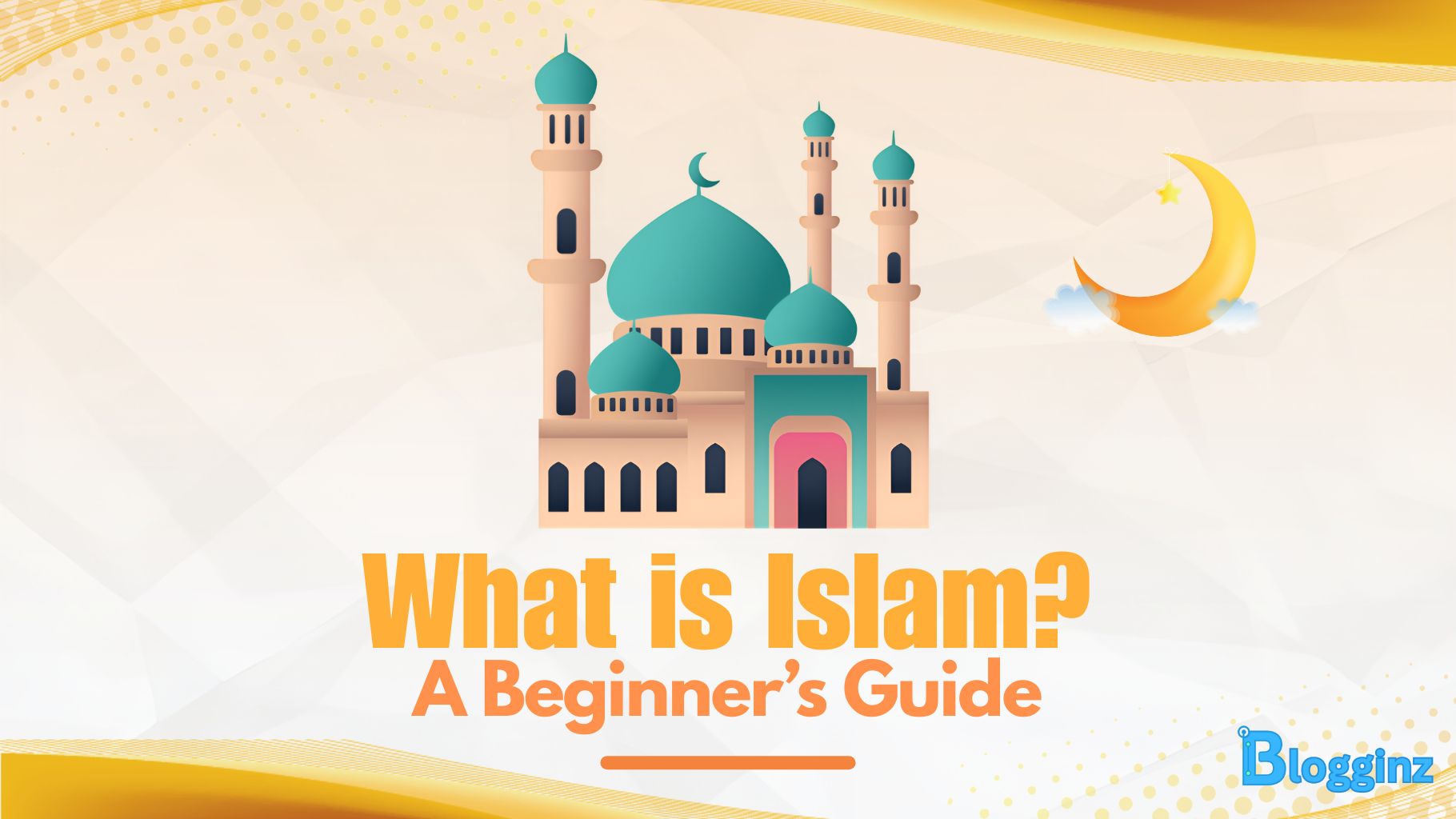In a world that is packed with many religious beliefs and practices, Islam is the major world religions which have the largest single community of over 2 billion people. People, however, are mostly ignorant of it. What are the teachings of Islam? Who was Prophet Muhammad? What is the Quran? If you are interested in and want to learn about Islam from a beginner’s point of view, this extensive guide is just the thing for you. This article will provide a simple and clear overview of Islam that you need, whether you are merely curious or have the intention of learning with a positive attitude and an open mind.
What Is Islam?
The term “Islam’ is derived from the Arabic word “Salaam” which means peace. The religion of Islam is thus the word that signifies “submission to the will of God.” A human being who is a follower of Islam is termed a Muslim, which is a word that means “one who submits.” The Muslims are the people who believe in the oneness of God (Allah), and the religion of Islam is the one that imparts that this life is a trial. This aims to adore God, to do good works, to stay away from evil, and to get ready for the never-ending life that will come.
Who Is Allah?
Allah is just the Arabic term for God. The word “Allah” is also used by Arabic-speaking Christians and Jews for God. According to Islam, Allah is One, without any partner, family, or equal. He is the Creator, the Provider, and the Most Compassionate. Followers of Islam think that Allah is omniscient, omnipotent, and omnipresent; however, He is still beyond human comprehension.
Who Was Prophet Muhammad (PBUH)?
Prophet Muhammad (peace be upon him) was born in Mecca, now in Saudi Arabia, in 570 CE. Muslims consider him the last prophet who was sent by God to teach people. Just like the prophets who came before him (e.g., Abraham, Moses, and Jesus), the message that Muhammad (PBUH) went around was one of God, the belief in only one God. When he was 40, Muhammad (PBUH) got the first of many messages from Allah through the Angel Gabriel. This went on for 23 years, and the messages became the Quran, which is Islam’s holy book.
What Is the Quran?
The Quran is the exact speech of Allah, revealed in Arabic to the last Prophet Muhammad (PBUH). It is a source of guidance for every aspect of life — from the acts of worship and morality to family, justice, and social responsibility.
One of the main points of the Quran is: The oneness of God, Goodness and charity, Patience and thankfulness, Fairness and truthfulness, the observance of filial piety, and the helping of neighbors
What Are the Five Pillars of Islam?
Islam is based on five pillars that are the main religious acts of worship, which every Muslim is obligated to do.
- Shahada (Faith)
The words of faith were:
“There is no god but Allah, and Muhammad is His messenger.”
This is a statement of one’s belief in Islam. - Salah (Prayer)
Five times during the day, Muslims are obliged to perform prayers.
These times are at dawn, noon, afternoon, sunset, and night.
Such prayers are a relationship on a personal basis between a believer and God. - Zakat (Charity)
Along with their overall wealth, they should provide a certain percentage (usually 2.5%) annually to the poor and needy. This act of charity is both a purification of wealth and a promotion of social equality. - Sawm (Fasting during Ramadan)
Each year in the month of Ramadan, Muslims observe a fast that is from dawn to sunset only — they refrain from food, drink, and bad behavior. Practicing this helps a person increase self-control, understand others better, and grow in terms of spiritual discipline. - Hajj (Pilgrimage to Mecca)
Perform a male pilgrimage to Mecca once during your lifetime if you are physically and financially capable of doing so. The journey symbolizes the concepts of faith, equality, and unity.
Beliefs in Islam (Six Articles of Faith)
Muslims define their faith in six core tenets:
One God – Allah, who was the only, the highest, and the most unique being.
Angels – For example, Gabriel, who was the one who passed God’s messages to humans.
The Scriptures of God – The Torah, the Psalms, the Gospel, and the Quran.
The Prophets – Starting from Adam, going through Noah, Abraham, Moses, Jesus, and finally to Muhammad (PBUH).
The Last Day – When every person will be judged for the actions they did in this life.
Fate – God’s knowledge and power over all things, including destiny.
What Is a Mosque?
A mosque is a place where Muslims worship. It is also a place where Muslims come together for prayers, learning, and community events. Masjid al-Haram in Mecca is the most important mosque because it is there that the Kaaba is located, which Muslims face during prayer. People of all backgrounds are welcome in mosques, and visitors are generally warmly received, particularly if there are open houses or guided tours.
Islam and Peace
Despite many misunderstandings, Islam is a religion of peace. The Quran clearly says:
“Whoever kills a person… it is as if he had killed all mankind.” — Quran 5:32
Muslims are taught to:
Neighborly kindness is important.
Forgive not seeking vengeance.
Treat everyone with justice and respect.
Muslims greet one another as follows: Assalamu alaykum, which means Peace be upon you.
Role of Women in Islam
Contrary to conventional assumptions, Islam respects women several rights 1,400 years ago, including:
- The right to own property
- The right to education
- The right to work
- The right to vote (in some Islamic history, long before the West)
- Inheriting rights
Women are considered equal in spirituality and moral worth, though Islam acknowledges natural differences between genders in certain roles and responsibilities.
Misconceptions About Islam
- Islam Encourages Violence.
This is a lie. Though Islam allows self-defense, it strongly prohibits aggression and terrorism. The term Islam itself has its origins in peace. - Muslim Worship of Muhammad
Muslims do not adore Muhammad. Though he is honored as a prophet, worship is reserved for Allah alone. - Oppressed Muslim Women
Often, oppression comes from culture rather than from faith. Many Muslim women are strong, educated, and independent. - Islam Is Only for Arabs
Universal among religions, Islam. The majority of Muslims are non-Arab. Some of the biggest Muslim populations are found in nations including Pakistan, Nigeria, and Indonesia.
Islamic Practices Beyond the Basics
Apart from the Five Pillars, Islam stresses:
- Good manners
- Looking information
- Respecting elders and parents
- Charity above and beyond zakat
- Staying clear of lying, gossip, and arrogance
- Animal rights and environmental stewardship
- Islam motivates believers to strive to be their best version
Islamic Celebrations
- Eid al-Fitr
Celebrated at the end of Ramadan, this is a joyful day of prayer, feasting, and charity. - Eid al-Adha
Commemorates Prophet Abraham’s willingness to sacrifice his son for God. It includes prayer and the sacrifice of animals, shared with family and the needy.
How Do You Become a Muslim?
Anyone can become a Muslim by sincerely saying the Shahada (declaration of faith)
“There is no god but Allah, and Muhammad is His messenger.”
No rituals, clergy, or ceremonies are needed. What matters most is belief in the heart, sincerity, and commitment to learning and growing in the faith.
Why Do People Convert to Islam?
People convert to Islam for many reasons.
- Many people accept Islam by:
- Quran recitation
- Encouragement from Muslim neighbors or friends
- Seeking solutions to the more profound queries about life
- Through Islamic teachings, sensing a spiritual link to God
- Seekers of truth are drawn by the simplicity, clarity, and focus on monotheism in Islam.
What Is the Muslim Community Like?
The Ummah is the worldwide Muslim community. It is welcoming, different, and distributed across nations, cultures, and languages. Islam unites people under one religion from the markets of Istanbul to the shores of Indonesia. Though there are some differences in customs and philosophies (e.g., Sunni and Shia), Muslims share the fundamental ideas and pillars of Islam.
Islam and Other Religions
Islam recognizes Judaism and Christianity as earlier revelations from God. Jews and Christians are referred to as “People of the Book.”
Muslims are encouraged to treat people of all faiths with kindness, justice, and respect. The Quran says:
“There is no compulsion in religion.” — Quran 2:256
Interfaith dialogue, understanding, and peace are essential Islamic values.
Islam offers a whole way of life; it is not only a faith. It instills a love of God, empathy for others, environmental responsibility, and accountability for one’s deeds. For beginners, Islam starts with an open heart and a curious mind. It is a religion guided by compassion, mercy, and direction. Should you be investigating Islam, bear in mind that it is a path many millions of people all around the world have discovered to be very significant and spiritually satisfying.
May your journey to understanding be blessed with light and wisdom.
FAQs
Islam is a monotheistic religion that means “submission to the will of God.” It teaches peace, worship of one God (Allah), doing good, avoiding evil, and preparing for the afterlife.
Allah is the Arabic word for God. In Islam, Allah is the one true Creator, merciful and beyond human understanding. He has no partners or equals.
Prophet Muhammad (PBUH) was the final messenger of God, born in Mecca in 570 CE. He received divine revelations over 23 years, which make up the Quran.
The Quran is the holy book of Islam, revealed to the Prophet Muhammad (PBUH). It provides guidance for worship, morality, justice, and daily life.
The Five Pillars are: Shahada (faith), Salah (prayer), Zakat (charity), Sawm (fasting in Ramadan), and Hajj (pilgrimage to Mecca).
Muslims believe in one God, angels, divine scriptures, prophets, the Day of Judgment, and divine destiny (Qadr).
A mosque is a place of worship for Muslims. It is also a community space for prayer, learning, and events. The Kaaba in Mecca is Islam’s holiest site.
Yes, Islam teaches peace, justice, kindness, and respect for all. Violence and terrorism are strongly condemned in Islamic teachings.
Islam granted women rights to education, property, work, vote, and inheritance over 1,400 years ago. Spiritually, men and women are equal.
No, Muslims do not worship Muhammad. They honor him as the final prophet, but worship is for Allah alone.
No, Islam is a universal religion. Most Muslims are non-Arabs, and Islam is practiced in diverse cultures worldwide.
To become Muslim, one must sincerely declare the Shahada: “There is no god but Allah, and Muhammad is His messenger.” No rituals are required.
People embrace Islam for its clarity, monotheism, spiritual peace, and guidance. Many are inspired by the Quran or by Muslim friends and community.
The two major celebrations are Eid al-Fitr (after Ramadan) and Eid al-Adha (commemorating Abraham’s sacrifice).
Islam respects all religions, but Islam greatly gives respect to Jews and Christians as “People of the Book.” It promotes interfaith dialogue, justice, and peaceful coexistence.



No comments yet
Be the first to comment